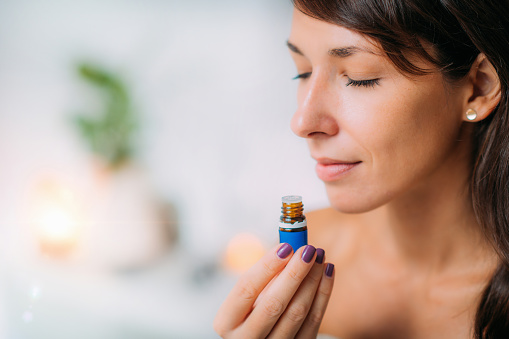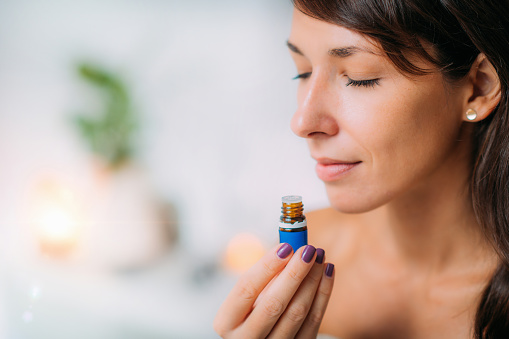
21 Mar Understanding Smell Loss and the Role of Essential Oils in Smell Training
Draining, ‘frightening’, ‘heart-wrenching’, ‘colourless’, something that ‘utterly isolates’ one,’ turning the light out in a room, ‘a vacuum’’.
These are some of the words and phrases that people who lost the one sense that we take most for granted, our sense of smell, used. ‘Smell blindness’ is perhaps a term that does some justice to the experience of smell loss.
Recent research debunks the long-held idea that the sense of smell in humans is inferior. First, there is evidence to suggest that the olfactory sense in humans is almost as developed in other mammals. And second, the loss of smell in humans shouldn’t be taken lightly, thinking that the purpose of this sense is not as significant.
How important is the human sense of smell?
Our sense of smell enhances the quality of life. Think about the following: that satisfying whiff of coffee that kicks starts your day; drinking in the aroma of your favourite dish cooking in the kitchen; the joy of smelling petrichor or freshly cut grass. These are indeed those little joys that make our experience of life so much richer.
A significant connection we often don’t make is how our sense of smell is related to our sense of taste. Taste and smell are different senses and have their individual receptor organs: the mouth and the nose respectively. However, the two are connected through the same airway so that smell and taste combine at the back of the throat to create the perception of flavour. Together they are known as our ‘chemosensory system’ or the chemical senses. This is why when people have a cold, they often lose their appetite. The lowered ability to enjoy a meal that one can’t taste or appreciate is what results in this.
Dr. Alan Hirsch of the Taste Treatment and Research Foundation in Chicago has asserted that ninety percent of what is perceived as taste is actually smell.
Our ability to smell is not just about being able to distinguish between different wines either. It’s actually a lot more fundamental and vital. Smell can alert us to dangers such as gas leaks or fires. It also helps us scan the quality of food and whether it is fresh or spoiled. Or about what kind of food appeals to us individually and if we should consume it. Research also suggests that our sense of smell plays a role at an unconscious level in things like how we interact with other people and also in selecting a suitable mate.
What is smell loss?
All of this gets compromised on when we lose our sense of smell (also referred to as hyposmia or anosmia). Ageing plays a role in our sense of smell deteriorating. But there is a host of other smell disorders which lead to a reduced ability to perceive odours. They are caused by various things such as smoking, growth in the nasal cavities, dental problems, hormonal issues, radiation, and so on. Smell loss also commonly occurs owing to injuries or viral infections. Head injuries that affect the part of the brain that controls our sense of smell is one way in which this loss takes place.
However, the loss of smell and subsequently taste was an issue that came to the fore in a big way during the COVID-19 pandemic.
It is believed that in certain kinds of smell disorders, the nerves in the olfactory epithelium get destroyed. This means that we aren’t able to perceive the molecules that contain the smell. The good news is that this situation can be reversed. Smell training is a technique that has shown positive results in helping people regain their ability to smell. This is especially true for post-viral and post-COVID cases.
What is ‘smell training’?
Smell training or Smell Retraining Therapy (SRT) is a process that involves actively sniffing four identical scents every day for at least 20 seconds. This has to be done mindfully, with the intention of regaining one’s sense of smell. This process of re-training the brain can last for a few months, till one succeeds in being able to smell once again. It is best to use four distinct scents that people are familiar with and have a mental model of.

Naturally, the use of essential oils has proven to be one of the most suitable means for scent training. Some popular fragrances chosen for smell training include rose, lemon, eucalyptus, and clove. The logic here is that they each belong to a distinct smell family and represent smells that one is most likely to have encountered and remember. The category of fragrances include floral, fruity, spicy, and resinous. Burnt and foul are two other categories but since they are more on the unpleasant side, they are not used for SRT.
AbScent is a UK-based organization that has dedicated itself to ending smell disorders. It has been hosting several workshops in central London to assist those who have are suffering from smell-blindness to regain this all-important sense.
Watch this video below by the BBC which was filmed at John Bell & Croyden, a prestigious location in London, near Bond Street to see how Absolute Aromas’ essential oils are being used for SRT.
Several people have already benefitted from SRT and Absolute Aromas’ oils which offer pure, organic, and high quality essential oils that are absolutely safe for SRT and various other uses.
We wish all those suffering from smell-blindness to be able to recover from it soon.




No Comments